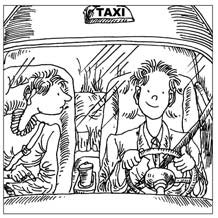The fairest fare is not negotiable
Updated: 2007-11-06 07:22

One evening many years ago, I was one of a dozen or so people waiting patiently in line for a taxi on a busy one-way lane in Hong Kong's business district. As a vacant taxi turned the corner and headed toward us, an impeccably dressed young man dashed out of an office building waving an eye-catching red HK$100 bill. He hopped into the taxi after it slammed on the brakes for him.
Some of the people in the queue were outraged by this unabashed flaunting of naked capitalism, which flew in the face of civility and orderliness. I had almost forgotten about that unpleasant taxi-jacking until I read a news report saying that politicians and commentators were calling for negotiable taxi fares.
All my encounters with negotiable taxi fares - most of them deeply unpleasant - occurred years ago in small towns in under-developed countries.
I have heard dark tales of passengers being robbed and dumped in the middle of nowhere by the thugs driving those meter-less taxis. Although that has never happened to me, I cannot help being nervous about bargaining with taxi drivers.
Therefore, it came as a shock to me, and, I am sure, to many of my fellow Hongkongers that the uncivilized practice of negotiating over taxi fares is threatening to make a comeback at the behest of some otherwise level-minded civic leaders. Their rationale seems to be based on the assumption that a flexible fare structure that is open to negotiation could help drive down fares during off hours.
But that assumption was obviously made without regard for the other side of the issue. To convince taxi owners and drivers to accept such a system, it would probably be necessary to allow them to bargain for higher fares during peak hours. If that is the case, we could conveniently dispense with the meters, which would no longer serve any useful purpose.

Even without the meddling of our high-minded civic leaders, some taxi drivers previously took the initiative by offering lower fares to lure passengers during the recession years. This irregular practice faded once it became clear the recovery was well on its way in 2004.
Now that the economy is practically booming on all fronts, we wonder if taxi drivers are as accommodating as they were during leaner times. In this seller's market, negotiation can only lead to higher fares and chaos.
And the suggestion to limit fare negotiations to call taxis is a pointless exercise that could have unwanted consequences. Many callers have grown accustomed to offering a surcharge on top of the regular charges and fares when beckoning a taxi. The amount offered depends largely on pick-up location, destination and time of travel. The authorities have turned a blind eye to this irregular practice. No taxi driver is known to have been prosecuted for overcharging by accepting such additions to his bill.
But legitimizing the practice could give the false impression that fare negotiations, in general, are condoned by the authorities and welcomed by the public. This could encourage unscrupulous taxi drivers to start "fishing" for customers who are willing to pay extra fares instead of picking up passengers at taxi stands.
Anyone in Hong Kong older than 30 years of age should remember the bad old days in the 1980s when flagging down a taxi was an open submission to extortion by grumbling drivers who seemed to take great pleasure in blaming the bad weather and traffic jams on their fare-paying passengers. To prevent that, the government has introduced a host of measures to reestablish the reign of meters in taxi land. No sensible person would want to regress into barbarism on the vague promise that we could save a few dollars along the way.
E-mail: jamesleung@chinadaily.com.cn
(China Daily 11/06/2007 page10)
|
|
|
|
|
|